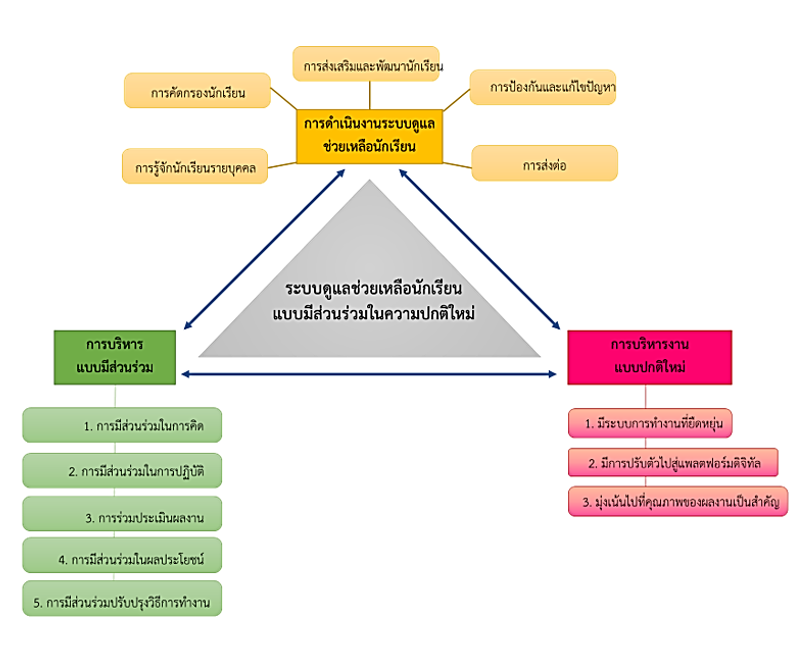THE DEVELOPMENT OF GUIDELINES FOR THE IMPLEMENTATION OF THE PARTICIPATORY STUDENT CARE SYSTEM IN THE NEW NORMAL FOR EDUCATIONAL INSTITUTIONS UBONRATCHATHANI PROVINCIAL ADMINISTRATIVE ORGANIZATION
Main Article Content
Abstract
The purpose of this research was to 1) study current conditions, desirable conditions, and need to implementation of the Participatory Student Care System in the New Normal for Educational Institutions Ubon Ratchathani Provincial Administrative Organization, and 2) to design, build and evaluate guideline for the implementation of the Participatory Student Care System in the New Normal for Educational Institutions Ubon Ratchathani Provincial Administrative Organization. The sample consisted of 13 school administrators and 212 teachers, totaling 225 people. The informatization group from 3 schools that are best practice of student care system and 5 experts. The research instrument was a scaling questionnaire, interview form and an assessment of appropriateness and feasibility of the guidelines. The statistic used in this research is average, standard deviation and modified priority index.
The results of the research were as follows: 1) The current state of the implementation of the Participatory Student Care System in the New Normal, Overall, it was at a high level. Desirable conditions of the implementation of the Participatory Student Care System in the New Normal, Overall, it was at a highest level. The need for the implementation of the Participatory Student Care System in the New Normal for Educational Institutions Ubon Ratchathani Provincial Administrative Organization, with a large average, ranked in descending averages. These include student support and development, forwarding, getting to know individual students, Prevention and Troubleshooting and student screening, respectively. 2) Guidelines for the implementation of the Participatory Student Care System in the New Normal for Educational Institutions Ubon Ratchathani Provincial Administrative Organization There are 5 elements of development guidelines. 30 Guidelines Appropriate Assessment Results Possibilities of the New Normal Participatory Student Support System Implementation Approaches From 5 experts, overall, they were appropriate at the highest level. and the possibility is at the highest level can be used.
Article Details

This work is licensed under a Creative Commons Attribution-NonCommercial-NoDerivatives 4.0 International License.
References
กระทรวงศึกษาธิการ. (2546). พระราชบัญญัติการศึกษาแห่งชาติ พ.ศ. 2542 และแก้ไขเพิ่มเติม (ฉบับที่ 2) พ.ศ. 2545. กรุงเทพมหานคร : องค์การรับส่งสินค้าและพัสดุภัณฑ์.
กองทุนพัฒนาสื่อปลอดภัยและสร้างสรรค์. (2563). โควิด-19 และระบาดวิทยา. สืบค้นเมื่อ 31 พฤษภาคม 2565. จาก https://learningcovid.ku.ac.th/
จิระนันท์ นนทะบุตร. (2564). การพัฒนาแนวทางการดำเนินงานระบบดูแลช่วยเหลือนักเรียน โดยประยุกต์ใช้แนวคิดชุมชนแห่งการเรียนรู้เชิงวิชาชีพสำหรับสถานศึกษา สำนักงานเขตพื้นที่การศึกษามัธยมศึกษาสุรินทร์. วิทยานิพนธ์ปริญญาการศึกษามหาบัณฑิต สาขาวิชาการบริหารและพัฒนาการศึกษา. คณะศึกษาศาสตร์ : มหาวิทยาลัยมหาสารคาม.
ชลิดา ลิ้นจี่. (2564). การบริหารงานสมัยใหม่ในยุค New normal กับผลการดำเนินงานของสำนักงานบัญชีในประเทศไทย. วารสารรัชต์ภาคย์. 16(44). 124-134.
บุญชม ศรีสะอาด. (2556). การวิจัยเบื้องต้น. พิมพ์ครั้งที่ 10. กรุงเทพมหานคร : สุริวิยาสาส์น.
ลัดดาวัลย์ โคตรพิมพ์. (2564). แนวทางการพัฒนาระบบดูแลช่วยเหลือนักเรียน โรงเรียนสังกัดสำนักงานเขตพื้นที่การศึกษามัธยมศึกษา เขต 27. วิทยานิพนธ์การศึกษามหาบัณฑิต สาขาวิชาการบริหารและพัฒนาการศึกษา. คณะศึกษาศาสตร์ : มหาวิทยาลัยมหาสารคาม.
สุนิสา มาสุข. (2560). การดำเนินงานระบบดูแลช่วยเหลือนักเรียนของครูโรงเรียนสังกัดองค์การบริหารส่วนจังหวัดระยอง. งานนิพนธ์ปริญญาการศึกษามหาบัณฑิต สาขาวิชาการบริหารการศึกษา. คณะศึกษาศาสตร์ : มหาวิทยาลัยบูรพา.
สำนักงานคณะกรรมการการศึกษาขั้นพื้นฐาน. (2564). คู่มือการคัดเลือกสถานศึกษาและสำนักงานเขตพื้นที่การศึกษาเพื่อรับรางวัลระบบการดูแลและช่วยเหลือนักเรียน ประจำปี 2564. สืบค้นเมื่อ 31 พฤษภาคม 2565. จาก https://www.nma6.go.th/web/3385
องค์การบริหารส่วนจังหวัดอุบลราชธานี. (2564). แผนพัฒนาท้องถิ่น (พ.ศ. 2566 – 2570).อุบลราชธานี : องค์การบริหารส่วนจังหวัดอุบลราชธานี.


